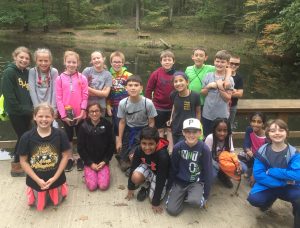Out for the Count
Is calculating more valuable than communicating?
October 28, 2017
It’s common knowledge at the U of NA that STEM is held in a quite high regard in our academic schedule. We are strongly encouraged each year to schedule sciences and math courses. But why is STEM considered more valuable than the humanities? In particular, why is Math presented as this important skill that we must take to succeed? There seems to be a great disturbance in the force of our Allegheny galaxy.
It seems as though this emphasis on STEM was caused by the Space Race with the Soviet Union during the Cold War. After the Russians launched Sputnik 1 in 1957, the American people believed we were incredibly far behind the Soviets in our education. Thus dawned the age of intensified study of mathematics and sciences. In an attempt to crush the Soviets and set up our success for the end of the Cold War, the education system in the United States took a 180 from a humanities focus to STEM.
I concede that this initiative made sense at the time, as the tensions of the Cold War were high and the United States took action to ensure our domination over the Soviets. Also, for all those that have endured the challenge of reading Russian literature, you know that the mere tangential touch of the Renaissance hurt our Eastern comrades pretty badly *cough* *cough* Dostoevsky *cough* *cough*.
But regardless of the literary iniquities of the Soviets, why is the United States still so heavily focused on math and science? Last I checked, the Cold War ended almost 30 years ago, so is there still is a need for tunnel vision on STEM education? Are there any major consequences to the zealous pursuit of STEM over the endless benefits of the humanities? Allow me to dissect this issue…
Ask a student at NA what they are planning for their college major and what their prospective career is, and you will certainly receive answers including doctor, engineer, pharmacist, physicist, computer coder, mathematician, etc. Finding students who want to be historians, politicians, communicators, or teachers is a rarity. Why? Because there is not enough emphasis on pursuing those subjects.
Of course, there is nothing wrong with being a doctor or an astrophysicist, especially if that is truly a student’s passion. One can make a significant impact in the world helping a lot of people through the application of science, but if one is solely focused on running numbers and learning how CRISPR can be used in genetic editing, there are huge questions that come to mind. Who is going to communicate to the people what those numbers mean? Who is going to relate to clients and test subjects and make sure the process is clear and understandable? Who will debate the ethics of these discoveries? Who will challenge progression and put perspective on research and technological advancement as it pertains to the human experience?
There is no right answer because the answers range from poets to historians. A education in history or English can fill the gaps that math and science create, and there is a more complete way to communicate the hard work of STEM majors to the public.
Perhaps that is the most important part of the humanities that North Allegheny and the United States as a whole seems to undervalue: the communication aspect. What good is history? What good is knowing that Napoleon got crushed at Waterloo? What good is English? Why do I need to sit here and read about some guy that lives in the woods and refuses to pay taxes? Why do I need to understand symbolism and metaphors in a poem that may or may not have even been written by Shakespeare?!
Answer: because it adds to the definition of the human experience.
Do you realize how crucial that is? By studying these seemingly inapplicable things, we are better able to communicate with each other and bridge cultures, nations, and maybe someday galaxies. History and English force one to search for answers to life’s biggest and most intimidating questions. They force one to search one’s own soul for meaning and purpose and discover the universal truths of mankind that develop who we are.
The humanities afford us the first-hand accounts of war, love, innovation, growth, spirituality, and the emotions that fuel our passions and desires. While STEM programs offer a doorway to the future, the humanities burst open the gates of the past that ensure our innovation doesn’t counterintuitively slow us down. We need to better communicate and relate to each other, especially as technology develops further and further, so we can continue to grow not only as the greatest nation on planet Earth but also a species of sophisticated, intelligent beings.
I am not a big fan of math and sciences, and in fact, I used to hate them with a burning passion. While I am still very passionate in my opinion of STEM courses, my motives for feeling this way have changed significantly.
No, my dear readers, math and science are not stupid, but they are far from superior to English and history. Technology and medical advancements change how our world works and improve our daily lives. However, if we are hypnotized by this progress and bury our heads into our devices and never cease crunching numbers and coding circuits, we will lose sight of the purpose for which we made the technology in the first place: to make our lives easier and allow more ways to connect with people. Only by studying the human experience through our humanities courses can we become an advanced civilization of progress.
Mrs. Spak, my junior year AP Bio teacher, always used to quote the movie GATTACA: “There is no gene for the human spirit.” Until recently, I never understood how profound that statement is. We can study DNA editing and create computers that become almost daily companions, but we will never be able to create or mimic true human emotion, passion, communication, and struggle. Only humans themselves are capable of such a feat.
If you have read this article and don’t believe the humanities are valuable and important, I encourage you to watch a few episodes of Black Mirror on Netflix. It does a great job showing how technology can be taken way too far and we as humans lose our humanity because of such intense progress. Just remember, there must be a solid balance between STEM and the humanities, because with great innovation comes great responsibility and new questions that need answering. Siri and Cortana can’t answer them, but they can lead you to the people that can: Shakespeare, George Washington, Henry David Thoreau, Voltaire, DaVinci, Confucius, Li Po, Martin Luther King, Julius Caesar, and countless others.
So, next time you pick up a history textbook or read a poem you find no value in, just remember that book you are holding is the secret to your place in the human experience; so, how will you define it?














Zachary Ehling • Nov 1, 2017 at 1:33 pm
My pop has a saying – one at his own expense – from his time studying as an engineer at Rutgers University: “Yesterday I couldn’t spell engineer. Now I are one.” Despite only being a jibe at the stereotypes of STEM, I find it very interesting to observe the division of opinions towards the sciences and the humanities world-wide. It would be interesting to see where other social values, such as the favoring of high income versus the desire to explore and communicate, would fall on the spectrum of those favoring each academic preference.
Madelynn Stibbard • Nov 1, 2017 at 1:29 pm
I can personally relate to your stance on this issue, and I do believe that the humanities are often deemed less important than the sciences. They get paid less on average and sometimes their jobs are just as and maybe even more important. I think that history classes are so valuable because it teaches us the mistakes of our past and how we a society can improve. I love your comment about how it is a unifier, and that it has the power to bring the world together. As a NA student, I have always felt the pressure to pursue a STEM career and I think that it is important to remind students that fields in the arts and humanities are just as respectable in their own regard. I think this was eloquently written and an important one to write. Thank you for writing it.
Cam Phillips • Oct 31, 2017 at 8:18 am
You make some good points here, especially about losing sight of purpose. On the other hand, the reality which you experience in NASH culture may be caused simply by student preference. Most kids prefer to do hands on work in Science classes, and find English and History unbearably boring. I think that Science and math are simply more engaging subjects, and a sense of objectivity is refreshing, especially after receiving the wrath of an unfair humanities teacher or particularly boring history lesson. That is not to say there isn’t value in those subjects- just that most people do not enjoy them as much as other things. The competitive nature of the district pushes kids towards subjects where there is one correct answer and they can easily push towards 100%.
Davis Creach • Oct 31, 2017 at 10:06 am
Fantastic point, Cam, I definitely agree with you on most of that. However, I would argue that Administration’s push towards math and science is still too intense, and the whole point I am trying to convey is that there is no ONE right answer in life, thus we need humanities to come closer to the answers. In your opinion, science is more engaging. In my opinion, I believe English and History is more engaging, simply because these subjects offer something that everyone can relate to and provide a conduit for personal and historical introspection. Thank you for the insight.